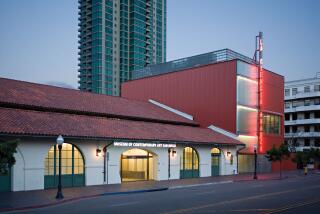A photo finish in San Diego
- Share via
Arthur Ollman, founding director of the Museum of Photographic Arts in San Diego, startled his staff and set off toward a blurry future this week. On Monday afternoon, he told the museum’s employees that he is stepping down at age 58 to pursue unspecified “other challenges.”
In the museum world, as elsewhere, such announcements often conceal internal power struggles, money trouble or health issues. But leaders of MOPA, widely regarded as one of the leading photo museums in the U.S., insist that there’s no such strife here, just a leader grown restless after nearly 23 years.
“Everyone wants to know, why would a seemingly rational person do this?” Ollman said in an interview Wednesday. “But I always saw myself as an artist who took a side street.... I’ve never been on the museum career path.”
Ollman said he expects to remain in the director’s chair until October 2006 or the arrival of a successor, whichever comes first.
“I don’t know if he has something up his sleeve or not,” said Mary Donnelly, president of the museum’s board of trustees. She said Ollman gave his news to the board on Sept. 30, though he’d warned her about 10 days before.
During Ollman’s tenure, MOPA has mounted 182 exhibitions on subjects from American immigration to post-bomb Nagasaki, featuring such photographers as Manuel Alvarez Bravo and Arnold Newman. Of those shows, Ollman has curated about 100.
The Balboa Park institution, which began with 7,500 square feet, now covers more than 31,000 square feet in the same building.
Ollman said he’d been thinking about leaving since 2000, when the museum expanded to add exhibition space and a 226-seat theater for movie screenings. But when post-9/11 doldrums hit the nonprofit community, Ollman said, the institution found itself struggling. Last year, the museum laid off its film curator and cut back its movie programming.
“While we were in that struggle, I could not leave,” Ollman said. “Now we’re in much better shape, and it seems like a better time.”
When Ollman delivered the news to staff, museum spokeswoman Courtney Blackwell said, “many of us were speechless.”
The museum has 28 full-time employees and an annual budget of $1.6 million. A young institution, it counts an endowment of less than $1 million. Ollman said the museum, which may have slipped as much as $160,000 into debt in the lean years of 2002-03, now has no debt.
Donnelly said the museum board has just begun assembling an advisory committee, including board members, staffers, donors and outside museum professionals, to make suggestions on the search for a successor.
“Everybody, the staff included, needs to have a say in this,” said Donnelly. “Arthur’s been our one and only. So we’ve never gone through this before.... And I don’t think we’re going to get somebody who knows as much about photography as Arthur does. I don’t think there are that many people.”
For Ollman, a well-regarded fine art photographer before he moved into museum management, “other challenges” could mean museum consulting or picking up a camera again -- “if I can find my cameras and clear the rust out of them.”
He did say he expected to remain in San Diego, where he and his wife, Leah Ollman, who freelances for The Times, are raising a 16-year-old daughter and a 13-year-old son. And he noted the entrepreneurial nature of his resume so far.
In college at the University of Wisconsin, Ollman said, he started a theater group. After college, he started a commune in Maine. After Maine, he helped start a nonprofit photography gallery, SF Camerawork, which remains in operation in San Francisco. He later earned a master of fine arts in photography from San Francisco’s Lone Mountain College, lectured at Ansel Adams’ photography workshops in Yosemite and won the MOPA job in part because of a recommendation from Adams himself.
Despite the years he has invested since then, Ollman said, “I always saw this as a position that I would at some point leave.”
More to Read
The biggest entertainment stories
Get our big stories about Hollywood, film, television, music, arts, culture and more right in your inbox as soon as they publish.
You may occasionally receive promotional content from the Los Angeles Times.










